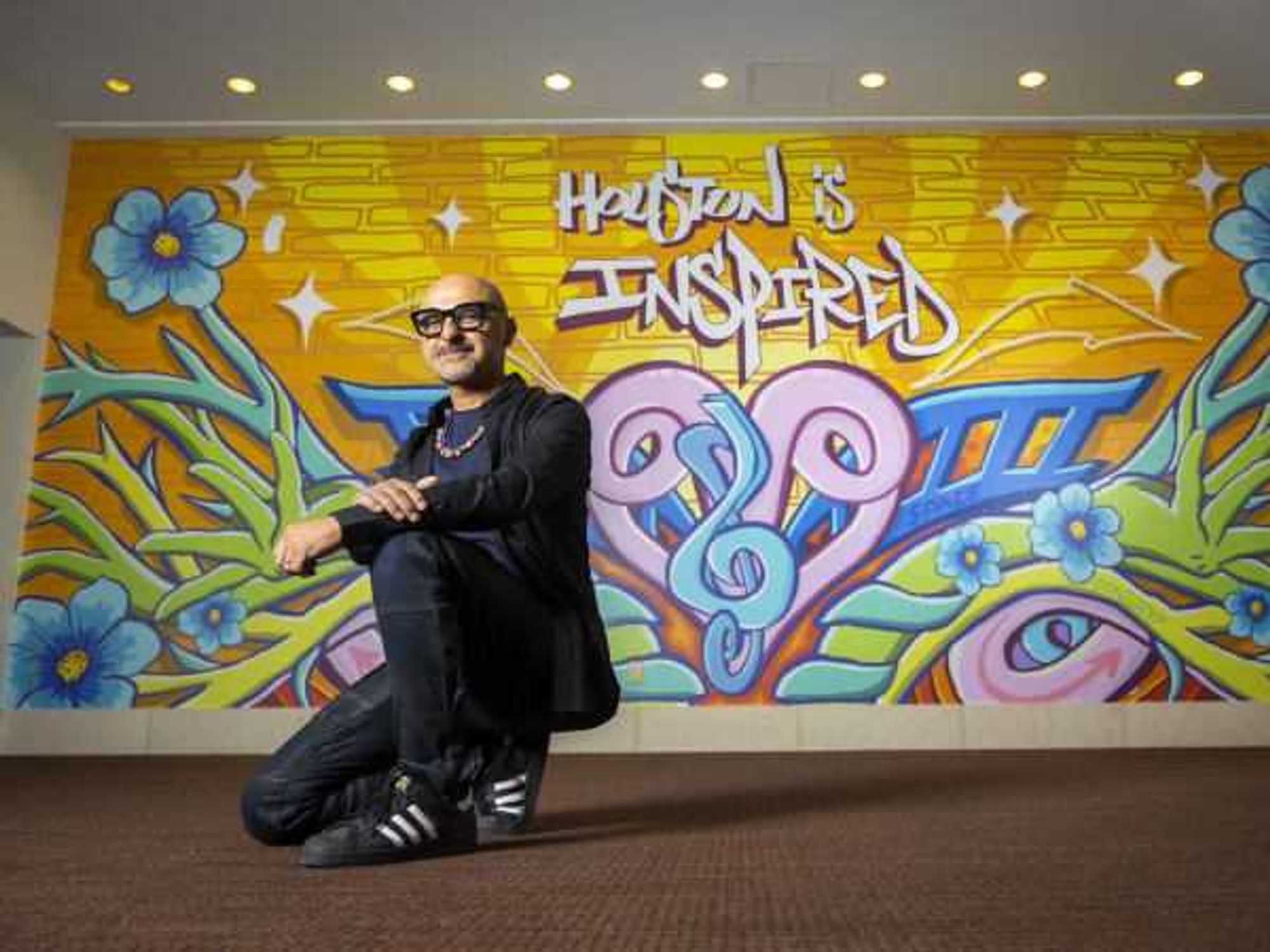From Russia with Love
Rocking RachFest: Kirill Gerstein takes on big muscle music in one of HoustonSymphony's most ambitious events ever
 Russian pianist Kirill Gerstein...Photo by Marco Borggreve
Russian pianist Kirill Gerstein...Photo by Marco Borggreve ...alongside Houston Symphony's music director Hans Graft and conductor EdwardGardner...Greater Houston Convention and Visitors Bureau
...alongside Houston Symphony's music director Hans Graft and conductor EdwardGardner...Greater Houston Convention and Visitors Bureau ...take on Sergei Rachmaninoff's Piano Concertos...
...take on Sergei Rachmaninoff's Piano Concertos...- ...in Houston Symphony's "RachFest."
It is often said that musicians are athletes of small muscles. The mastery over their physical instruments is a never-ending process requiring constant practice, attention and refinement, as it is minute and subtle movements and gestures that morph something beautiful into the realm of the sublime.
When it comes to the piano scores of Sergei Rachmaninoff, it's about big burliness as much as it is about the finesse evoked pinky up etiquette. Think big muscle car classical music, yet with a sensitive romantic side, the kind that can incite such passion that impromptu make-out sessions with a complete stranger are not only a possibility, but rather very likely.
It's the apex of lush, dense Russian Romanticism.
It's no wonder tunes from Rachmaninoff's piano concerti have appeared in popular culture, like in Frank Sinatra's "I Think of You" and "Ever and Forever" and most recently, in Clint Eastwood's 2010 film Hereafter.
"When you first encounter Rachmaninoff's piano writing — unlike the Tchaikovsky concerto for example where the difficulties do not go away — you wonder how what's on the page is ever going to work.
For the instrumentalist, performing just one of them is akin to participating in a brutal CrossFit session. Playing all four in succession is a feat beyond Olympic proportions, one that will be attempted by 32-year-old Russian pianist Kirill Gerstein, conductors Hans Graf and Edward Gardner on the stage of Houston Symphony.
The Russian takes on the Russian: RachFest
That's RachFest, a three-week musical bacchanal, starting Thursday night and running through Jan. 22 at Jones Hall, during which Gerstein takes on the "Rachs" over three weekend concert runs. On the program are also Rachmaninoff's Symphonic Dances, Isle of the Dead, Symphony No. 3 and Vocalise.
"I have known Kirill for almost a decade," Hans Graf, Houston Symphony's music director, says. "He's a very special man, very clear thinker, an intellectual, speaks many languages, a profound musician with no technical limits."
The symphony has taken on big projects, like Orbit - An HD Odyssey, but Graf believes RachFest is the biggest initiative presenting a single soloist, a concept two years in the making.
Kirill is no stranger to Houston audiences having been featured in Ravel's Piano Concerto in G and Gershwin's Rhapsody in Blue in January 2010 and Rachmaninoff's Paganini Variations and Liszt's Totentanz with Graf and the Houston Symphony in September 2007.
"This will be the first time I get a chance to play all four concerti," Kirill says. "As a pianist, I have trained longer that most professional athletes, since the age of 3. Working on all of them at the same time is an immersive experience.
"I have discovered connections between passages across all the works that helps me interpret and understand the overall musical structure."
The big-handed challenge
Rachmaninoff is in the company of a short list of virtuoso performers cum-composers, alongside Niccolò Paganini and Franz Liszt, who wrote with the instrument in mind, sometimes purposely to make the work's execution laborious, something worth working towards.
"As a pianist, I have trained longer that most professional athletes, since the age of 3," Kirill says.
Rumored to have suffered from Marfan syndrome, a genetic condition that bestowed him massive hands and long fingers, Rachmaninoff's music demands larger-than-usual hand spans.
"When you first encounter Rachmaninoff's piano writing — unlike the Tchaikovsky concerto for example where the difficulties do not go away — you wonder how what's on the page is ever going to work," Kirill says.
"But with time, practice and patience, it becomes fluent and your muscles know just what to do. It's very well written and fits the instrument like a glove on a big hand."
Pianists like Alicia de la Rocha, who had small hands, managed to play them exquisitely. With cleverness and musicality, one can always manage, but having big hands is an advantage, Kirill says.
During a performance of the Third Concerto in 1998 with the Fort Worth Symphony, Van Cliburn collapsed from vasovagal hypotensive reaction, probably due to dehydration and overexertion. It was written for Josef Hofmann, who never performed it claiming it "wasn't for him," even though it was Hofmann who inspired Rachmaninoff to practice more than 15 hours per day to match his virtuosity.
"The music is some of the most difficult ever written, and written purposefully to be difficult," Graf says. "Yet the orchestra is just as important, sometimes the scoring is at the level of the piano."
The concerti call for a large battery of instruments. The challenge is to shift the approach to mimic the intimacy of chamber music to be able to adapt to changes in tempi and rubati. This grants the soloist the freedom to be flexible and spontaneous, in addition to the space to bring out the coloristic nuances and subtleties.
During thick passages, the piano has to have enough virility to sail above the orchestra.
"Aside from notes themselves, the music demands quickness of change," Kirill says. "Though you never have to play awkward passages over and over again, tough and varying fragments in succession means you have to be light on your feet to ski through the complex musical terrain."
Houston Symphony's "RachFest" runs Jan. 5 to 22 at Jones Hall. A three-concert package starts at $99. Individual concerts start at $25 and can be purchased online or by calling 713-224-7575.

